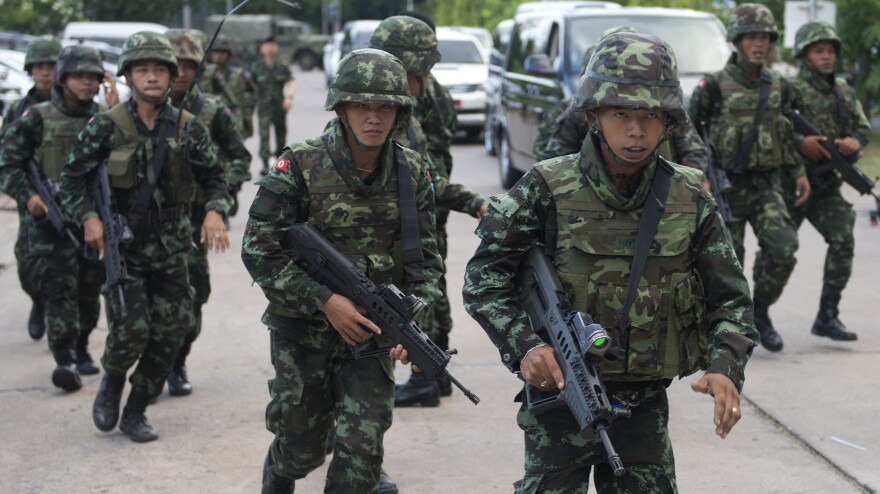Thailand's army is now running the country. Two days after declaring martial law — and saying it wasn't staging a coup — the military has changed its mind, Thailand's army chief says.
Gen. Prayuth Chan-ocha announced the coup d'etat on national television, saying the military is taking over to give Thailand a chance to "return to normal." The country has been locked in conflict since at least November, and Prime Minister Yingluck Shinawatra was removed from office by a court earlier this month.
"In order for the situation to return to normal quickly and for society to love and be at peace again ... and to reform the structure of the political, economic and social structure, the military needs to take control of power," Prayuth said, according to Reuters.
Update at 8:45 a.m. ET: How It Happened
From Bangkok, reporter Michael Sullivan describes how the coup took place. He tells NPR's Morning Edition that many see the takeover as an inevitable continuation of events that began with the martial law declaration earlier this week.
"The surprising thing today was that the leader of the army was actually meeting with various representatives of the pro- and anti-government forces," Michael says. "He was trying to come up with some sort of a compromise."
"When that didn't happen, he just pulled the plug on those talks, and actually detained several members of those parties."
Michael says that in a sense, the events were "sort of like one of those scams the cops run, when they want people who are out on a fugitive warrant — they say, 'You've won a free TV, please come and claim your prize.' "
The Thai military last seized power in 2006. Michael says it will again try to craft a constitution that can bring a unified government not controlled by people linked to wealthy former Prime Minister Thaksin Shinawatra, who was deposed in 2006. He is the brother of the recently ousted Yingluck Shinawatra.
Our original post continues:
Some of Thailand's broadcast TV stations ceased transmissions Thursday, Michael reports for our Newscast unit, adding that others are running loops of the general's statement.
Citing Gen. Prayuth, The Bangkok Post reports that the country is now being run by "a national peace-keeping council."
The newspaper adds that the move came after representatives of the seven groups that had been trying to work out a plan to rule the country failed to reach an agreement.
One order that has gone out to the general public is that they should observe a curfew, from 10 o'clock each night to 5 the next morning.
Update at 11:35 a.m. ET: The Scene In Bangkok
Michael Sullivan sends a quick note to describe how the curfew is affecting everyday life.
"Traffic tonight was horrendous, even by Thai standards," he says. "And the place I went to get my takeout was mobbed by people scrambling to order/eat before the curfew."
Update at 7:50 p.m. ET: Kerry Says 'No Justification' For Coup
"I am disappointed by the decision of the Thai military to suspend the constitution and take control of the government after a long period of political turmoil, and there is no justification for this military coup," Secretary of State John Kerry said in a statement Thursday. "I am concerned by reports that senior political leaders of Thailand's major parties have been detained and call for their release. I am also concerned that media outlets have been shut down."
Pentagon spokesman Col. Steven Warren also said the U.S. is reconsidering military cooperation with Thailand following the coup.
"We've been reviewing our military-to-military assistance including the [Cooperation of Afloat Readiness and Training Exercises]," Pentagon spokesman Colonel Steven Warren said, referring to US-led naval drills in the Pacific.
Copyright 2021 NPR. To see more, visit https://www.npr.org.



